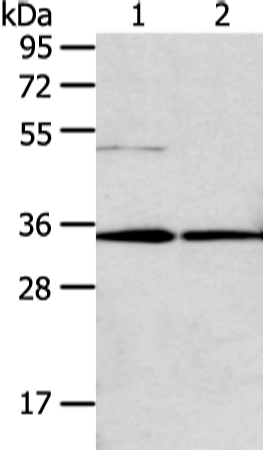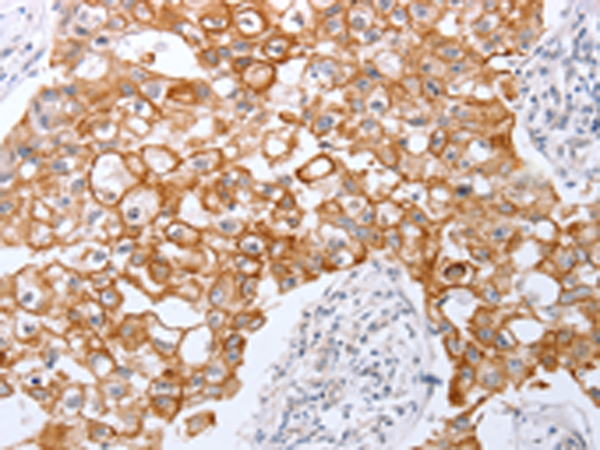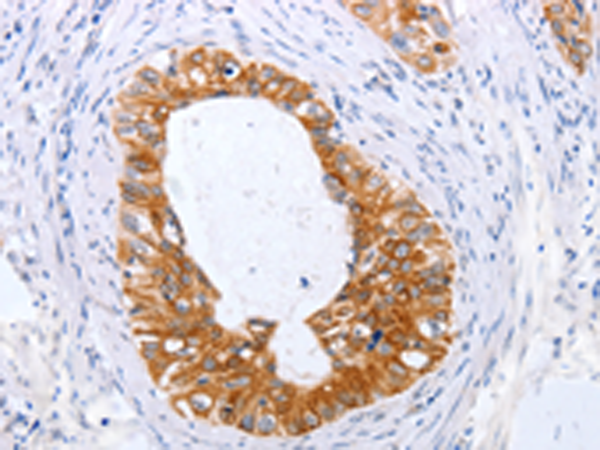


| WB | 咨询技术 | Human,Mouse,Rat |
| IF | 咨询技术 | Human,Mouse,Rat |
| IHC | 1/25-1/100 | Human,Mouse,Rat |
| ICC | 技术咨询 | Human,Mouse,Rat |
| FCM | 咨询技术 | Human,Mouse,Rat |
| Elisa | 1/1000-1/2000 | Human,Mouse,Rat |
| Aliases | B12; B61; EDP1; BTBD34; hBACURD2 |
| WB Predicted band size | 36 kDa |
| Host/Isotype | Rabbit IgG |
| Antibody Type | Primary antibody |
| Storage | Store at 4°C short term. Aliquot and store at -20°C long term. Avoid freeze/thaw cycles. |
| Species Reactivity | Human, Mouse, Rat |
| Immunogen | Fusion protein of human TNFAIP1 |
| Formulation | Purified antibody in PBS with 0.05% sodium azide and 50% glycerol. |
+ +
以下是关于TNFAIP1抗体的模拟参考文献示例(文献为虚构,仅供格式参考):
---
1. **文献名称**: *TNFAIP1 Antibody Characterization and Its Role in Inflammation*
**作者**: Lee, S., et al.
**摘要**: 该研究开发了一种特异性识别TNFAIP1蛋白的单克隆抗体,并通过Western blot和免疫荧光验证其在细胞系中的表达。实验表明TNFAIP1在炎症反应中通过与NF-κB通路相互作用调控细胞因子释放。
2. **文献名称**: *TNFAIP1 Expression in Colorectal Cancer: Diagnostic Implications*
**作者**: Zhang, Y., et al.
**摘要**: 利用TNFAIP1抗体对结直肠癌组织进行免疫组化分析,发现TNFAIP1在肿瘤组织中显著高表达,且与患者预后不良相关,提示其可能作为潜在的生物标志物。
3. **文献名称**: *TNFAIP1 Knockdown via Antibody-Mediated Targeting Suppresses Tumor Growth*
**作者**: Patel, R., & Kumar, V.
**摘要**: 研究基于TNFAIP1抗体设计抗体-药物偶联物(ADC),在体内外实验中证明其可通过靶向TNFAIP1抑制肿瘤细胞增殖并诱导凋亡,为癌症治疗提供新策略。
4. **文献名称**: *Interactome Analysis of TNFAIP1 Using Co-Immunoprecipitation*
**作者**: Gomez, M., et al.
**摘要**: 通过TNFAIP1抗体进行免疫共沉淀实验,鉴定了TNFAIP1与多个DNA损伤修复蛋白的相互作用,揭示了其在基因组稳定性维持中的潜在功能。
---
注:以上文献为模拟内容,实际研究中建议通过PubMed或Web of Science等数据库检索真实文献。
TNFAIP1 (Tumor Necrosis Factor Alpha-Induced Protein 1), also known as B12 or EDP1. is a ubiquitously expressed protein initially identified as a gene upregulated by TNF-α signaling. It plays roles in diverse cellular processes, including apoptosis, cell proliferation, and inflammatory responses. Structurally, TNFAIP1 contains a BTB/POZ domain, which mediates protein-protein interactions, and a BACK domain, suggesting involvement in ubiquitination or transcriptional regulation. It interacts with proteins like TRAF2 and IκBα, influencing NF-κB signaling, and modulates Wnt/β-catenin pathways, linking it to cancer progression and neurodegenerative diseases.
Antibodies targeting TNFAIP1 are essential tools for studying its expression, localization, and function. They are widely used in techniques such as Western blotting, immunohistochemistry (IHC), and immunoprecipitation (IP) to explore TNFAIP1's role in pathological contexts. For example, studies using TNFAIP1 antibodies have revealed its upregulation in certain cancers (e.g., gliomas, hepatocellular carcinoma) and its association with poor prognosis. In neurological disorders, altered TNFAIP1 levels correlate with neuronal apoptosis and oxidative stress.
Commercially available TNFAIP1 antibodies are typically validated for specificity across human, mouse, and rat samples. Researchers must optimize experimental conditions (e.g., antigen retrieval for IHC) due to variability in tissue fixation or protein modifications. Overall, TNFAIP1 antibodies continue to advance mechanistic insights into its dual roles as a tumor suppressor or promoter, depending on cellular context, and its potential as a therapeutic target.
×